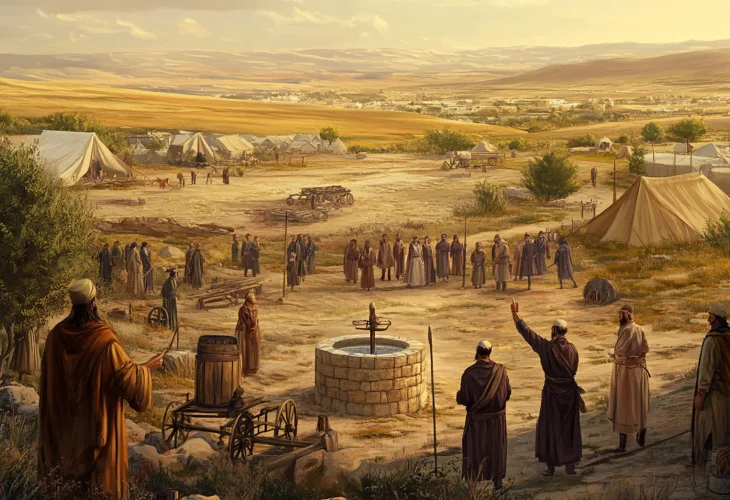History and Archaeology
Rehovot: A City Born of Vision, Torah, and Determination
Founded to be self-reliant and faithful to Jewish law, Rehovot grew through farming, trade, and a remarkable partnership with Baron Rothschild

Have you ever heard of the “City of Science and Citrus”? If you have, you might be remembering a name Rehovot proudly carried decades ago.
On the 11th of Adar 5650 (1890), 135 years ago, members of the Polish group “Menucha VeNachala,” led by Eliyahu Eisenberg, arrived at the “Duran” lands in the lowlands. The land was purchased from a wealthy Christian named Butrus Roke. At first glance, all one could see was endless sand. But those who knew the history said that “Duran” preserved the name of the ancient Jewish town “Doron,” mentioned in the Jerusalem Talmud, Tractate Pe’ah. If Jews had once lived here, they reasoned, there must be water underground and so it was decided to dig a well deep enough to reach it.
That day, a small crowd gathered around the newly dug well, its bottom holding precious groundwater. All around was wilderness, where only foxes roamed. Eliyahu Eisenberg spoke to the group: “My brothers, you see this place, empty and wild. But soon, you will see old men and women, and children playing in the streets of the settlement we are founding here.”
Some indeed lived to see that vision come true, as Rehovot grew into a large city with over 150,000 residents.
The name “Rehovot” was chosen by Eisenberg, inspired by two biblical sources: the verse in Zechariah, “Old men and old women will yet sit in the streets of Jerusalem,” and the event in the Torah when our forefather Yitzchak (Isaac) dug a well and named it “Rehovot,” saying, “Now Hashem has given us room, and we will flourish in the land.”
The goal of founding Rehovot was to create an independent community that lived fully according to Jewish law (halacha), without relying on Baron Rothschild’s financial support. The Baron was known for his extraordinary generosity and his warm Jewish heart, but many of his office clerks were modern and not Torah-observant, which sometimes made working with them difficult. The founders of Rehovot wanted to build a life through their own work, without charity. Rabbi Yaakov Broida supported the land purchase, and Rabbi Mohiliver helped organize the settlers.
The lowland soil had been untouched for nearly two thousand years, but it was rich in minerals. The settlers planted vineyards, producing excellent grapes that were sold to the nearby Rishon LeZion winery. The success was immediate. Soon, they planted orchards, and the area bloomed with fruit. In 1920, the building of a train station in Rehovot made it much easier to send citrus fruits overseas.
A particularly successful agreement was reached with Baron Rothschild: he bought all of Rehovot’s vineyard grapes for his Rishon LeZion winery, while the settlers marketed Carmel wines in Russia. Both sides benefited greatly from this arrangement for many years.
Unlike other farming communities of the time, the farmers of Rehovot didn’t need to grow grain or take on extra trades. The vineyards and orchards alone brought in enough income for them to prosper, and soon the name of Rehovot became well-known.
In 1907, dozens of Yemenite Jewish immigrants arrived and set up tents near the town. This would later become the neighborhood of Sha’arayim. Over time, Rehovot expanded with more neighborhoods.
In 1937, Chaim Weizmann, who would later become Israel’s first President, founded a scientific institute for chemistry in Rehovot. Today, it is known as the Weizmann Institute and is one of the most important scientific research centers in the world. When it first opened, it was called the Ziv Institute and was funded by Lady Rebecca Sieff, the owner of the global store chain “Marks & Spencer.” During Israel’s War of Independence, the institute became a base for the Science Corps, producing weapons and inventions that helped Jewish fighters. Today, the institute is famous worldwide and even houses advanced technology like a particle accelerator and laser systems for diamond cutting.
As with many cities founded in that period, although many of Rehovot’s founders were religious, some of their children did not continue in their ways. Still, Rehovot has always had a strong Torah-observant core. The city’s rabbi, Rabbi Shlomo Kook, was a respected Torah scholar and dayan (rabbinic judge). In 1972, tragedy struck when Rabbi Kook and his family were killed in a railway accident. His brother, Rabbi Simcha Kook, became the city rabbi and founded the “Maor HaTalmud” yeshiva (Torah study academy), which began in his home and later moved to its own building. Today, the yeshiva has 400 students, and along with many other yeshivas and Torah communities, the sound of Torah learning is strong in the “City of Citrus and Science.”

